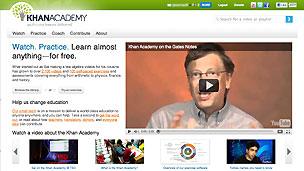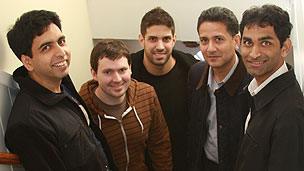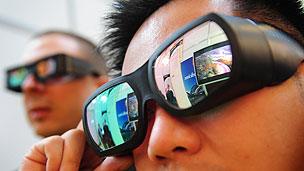Screen test for the online classroom
- Published

The Khan Academy has been backed by Bill Gates as the "start of a revolution"
Is the biggest classroom in the world the screen in front of you?
The screen - whether on a laptop, a tablet, a mobile phone, even that quaint old device a television set - plays a huge part in the lives of young people.
When a student protest ended in London this month, the last knot of marchers did what came naturally - they sat on the edge of the pavement and got out their laptops, glowing like some kind of digital campfire.
Entertainment, socialising and information have become screen-shaped. And a cluster of global online learning projects are bringing education into the frame too.
Among those attracting attention is the Khan Academy, the US-based free online tuition service, which helps youngsters to catch up on lessons and bright children to stretch themselves further.
If you haven't heard of it, it'll be appearing at a dinner party conversation near you soon. The most recent figures show that the number of people using the website each month has risen threefold in a year to 3.5 million.
Push-button teacher
The combination of broadband, cheaper laptops and iPad-style tablet computers is putting such online teaching services into the mainstream.

Shantanu Sinha (right) and the Khan Academy team are teaching 3.5 million students
The Khan Academy has thousands of step-by-step videos explaining topics in subjects such as maths and science. It's also interactive, allowing individual students to test themselves again and again and then chart their own progress. On tablet devices, students can write directly on to touch screens.
It's a deceptively simple concept - YouTube meets trigonometry meets an interactive whiteboard - with 85 million videos downloaded so far.
It's free to users, but has some very wealthy friends. And with its Californian base and its instant growth, it's more like a digital start-up than an education initiative.
Bill Gates has hailed the Khan Academy as the "start of a revolution". He says that he uses the bite-sized tutorials himself and with his children.
He hasn't only offered warm words, his charitable foundation has also given cold cash - $5.5m (£3.5m) so far. Google has put in $2m (£1.3m) and Sean O'Sullivan - the entrepreneur credited with coining the phrase "cloud computing" - has donated $5m (£3.2m) through his foundation.
Shantanu Sinha, Khan Academy president and chief operating officer, says the project is part of a "major transformation" in education.
"It's being transformed by accessibility," he says. Anyone with an internet connection can plug into the resources now available online, regardless of where they live.
"Cheap tablet computers are going to become ubiquitous. Access to information will be like access to clean running water. A great education will be seen as a basic human necessity."
Keep taking the tablets
The arrival of devices such as the iPad is a game-changer, he says, looking at student-friendly qualities such as "the intimacy, the portability, the low cost". The $100 tablet will soon be arriving on the shelves, he predicts.

An Oxford study says the internet is now the default place for information for "next generation users"
The other key driver for the Khan Academy is the idea of personalising education - allowing children to progress at their own pace, setting an individual pathway rather than being taught within the limitations of a class of widely varying abilities.
This idea of trying to personalise learning is a highly topical issue, pushing the modernising iZone experiments taking place in New York.
The Khan Academy website allows pupils to follow a structured course through a subject, with banks of videos and questions to answer, in a growing number of languages.
It's not a replacement for school or teachers, says Mr Sinha. And in fact the academy is setting up its own real-world summer school and is working with schools in the San Francisco area in California.
But it does raise some big questions about the future functions of schools and universities - not least when US colleges are charging students $50,000 per year.
The other striking aspect of the Khan Academy equation is the reach of such a small team of people. There are volunteers, but as of November 2011, there are only 20 full-time staff. Millions of students, scattered around the world, are being served by a staff the size of a primary school.
The idea of institutions making highly-prized lectures available more or less for free has been trailblazed by iTunes U, the tweedy cousin of Apple's iTunes music and video download service.
At the ripe old age of four, iTunes U is a granddaddy of such online teaching resources.
It's such a spectacular resource that it's almost overlooked. Almost a million lectures and sets of course materials are being downloaded every day from 1,000 universities around the world, including many of the most illustrious institutions.
Academic chart show
When students have been protesting about tuition fees this month from London to Quebec to Dublin to California, this remains a remarkable door left open for untariffed teaching, with 500,000 free items available.
It even has its own top 10 chart. This week, at number one, there's a talk by the artist Rachel Whiteread in a series of lectures from New York's Museum of Modern Art.

New York's Museum of Modern Art is top of the iTunes U academic download chart
Lectures from Harvard, Oxford, the Open University, Stanford and Nasa all make appearances in the top 10.
It's important not to hype shiny new tech toys, but there is some synergy between these instant, downloadable lectures and the iPad type of tablet computer. The Open University, one of the world's most popular providers of iTunes U material, has reported the disproportionate rise in downloads to iPads.
In the US, more than 2,300 school districts have begun programmes using iPads - and a growing number of classrooms have one per pupil.
But what will all this mean for the future?
"Virtual schools" have become an increasingly common feature of the US system, teaching children who are mostly at home. Along with the arrival of charter schools, there are also virtual charter schools, funded by taxpayers.
Such digital innovations have had the backing of the Obama administration. They want to keep up with the online ambitions of countries such as South Korea.
It has prompted headlines such as "My teacher is an app".
But there have been concerns that the relative cheapness of virtual teaching could be used as a way of cutting spending on traditional bricks-and-mortar schools.
There have also been questions about virtual schools being an entry point for for-profit organisations selling educational technology, assessment and management services. There are claims that it could be about outsourcing rather than resourcing.
Next generation
Maybe such tensions reflect the difficulty that conventional education - with its command and control instincts - has with the unmapped abundance of online information.

The portability of tablet computers is putting online learning into young hands
William Dutton of the the Oxford Internet Institute at the University of Oxford says traditional universities have struggled to reconcile their teaching with the way that young people now gather information.
Outside the classroom, in "informal learning", the internet is the first place that many people look for information, whether it's using Wikipedia or searching for some specific detail, says Professor Dutton.
"But universities have not figured out how to integrate online information into courses," he says.
So far online degrees have been something of a poor relation, often aimed at vocational rather than academic subjects, and offering a cheaper route for those unable or unwilling to pay for the full residential university experience.
But Professor Dutton expects this to change, with all universities likely to shift, at least to some extent, towards "blended" learning, using both face-to-face teaching and online learning.
He argues that the evidence points towards future learners being even more immersed in the online world.
The Oxford institute's most recent survey of internet use, external shows that "next generation users" are characterised by using multiple, portable online devices - whether it's laptops, mobiles or iPads.
And when they want any kind of news, information or fact-finding, the first port of call is overwhelmingly the internet.
As such it will become increasingly impractical to keep online learning out of universities, says Professor Dutton.
The university is also using this clickable access as a way of demystifying Oxford, with a series of Oxford Voices videos, which allow potential students to hear from staff and students.
Will online learning reach the places other teaching has missed? Or will it replicate all the inequalities, but in a hi-tech form?
The central issue for Shantanu Sinha is giving more people the chance to have access to the core teaching materials they need, in the most useful form, regardless of income or geography. It's an online egalitarianism.
"Everyone deserves an education," he says.